Damn, there was a lot going on there.
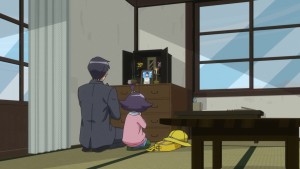 As usual, I had to take a step back after this week’s episode of Concrete Revolutio, just to try and make sense of it. It’s like an ocean of ideas, this show, and it’s not as if the surface is calm – there’s a lot of plot going on all the time. But never mind the text, the subtext just goes on and on – this is a series that’s genuinely deep. And it’s quite distinctly Japanese in a way most Bones shows are not, which all but guarantees that a sizable chunk of that subtext will whizz right by someone not native to the country, at least on first viewing.
As usual, I had to take a step back after this week’s episode of Concrete Revolutio, just to try and make sense of it. It’s like an ocean of ideas, this show, and it’s not as if the surface is calm – there’s a lot of plot going on all the time. But never mind the text, the subtext just goes on and on – this is a series that’s genuinely deep. And it’s quite distinctly Japanese in a way most Bones shows are not, which all but guarantees that a sizable chunk of that subtext will whizz right by someone not native to the country, at least on first viewing.
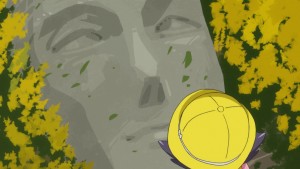 In a sense, I think the episodic storylines of Concrete Revolutio are like sociopolitical parables. The immortal family, the Devil siblings, the bug people – each of these are vehicles to explore a series of ideas. This time around we have a father and daughter, still in mourning over the passing of the mother of the family. The dad is a mild-mannered salaryman (working for the same corporation doing most of the superhero exploiting) whom the daughter resents over her mother’s death (and his hangdog demeanor over it). Beside their house grows a massive field of Goldenrod, an invasive species but one the daughter loves.
In a sense, I think the episodic storylines of Concrete Revolutio are like sociopolitical parables. The immortal family, the Devil siblings, the bug people – each of these are vehicles to explore a series of ideas. This time around we have a father and daughter, still in mourning over the passing of the mother of the family. The dad is a mild-mannered salaryman (working for the same corporation doing most of the superhero exploiting) whom the daughter resents over her mother’s death (and his hangdog demeanor over it). Beside their house grows a massive field of Goldenrod, an invasive species but one the daughter loves.
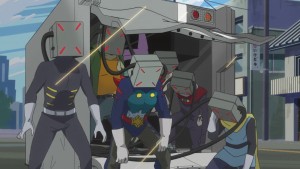 The first piece of context that’s important here is that Goldenrod has a place in Japanese history. It is indeed an invasive species in Japan, and the government waged an eradication campaign against it during the time period being reimagined in ConRevo. It became a kind of symbolic counterattack against what the right wing saw as too much foreign influence in Japan – which they blamed for the student revolution that turned violent in the early 70’s – all kinds of unfounded claims about it being dangerous to humans were tossed about. Given the renewed strength of nationalism in today’s Japan under Abe, this is all too timely a subject for Concrete Revolutio to take on.
The first piece of context that’s important here is that Goldenrod has a place in Japanese history. It is indeed an invasive species in Japan, and the government waged an eradication campaign against it during the time period being reimagined in ConRevo. It became a kind of symbolic counterattack against what the right wing saw as too much foreign influence in Japan – which they blamed for the student revolution that turned violent in the early 70’s – all kinds of unfounded claims about it being dangerous to humans were tossed about. Given the renewed strength of nationalism in today’s Japan under Abe, this is all too timely a subject for Concrete Revolutio to take on.
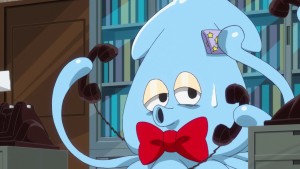 Also timely is the focus on the crackdown against freedom of expression taking place in “Year 47” (Japan under Abe was recently judged to be among the worst industralized nations in the world in terms of freedom of the press). These references to plazas being turned into passageways (“No stopping! This is not a plaza.”) are not here by chance. This was a response to the counterculture movement in 1970’s Japan, too – an attempt (largely successful in some ways) to restore order by limiting public expression and dissent.
Also timely is the focus on the crackdown against freedom of expression taking place in “Year 47” (Japan under Abe was recently judged to be among the worst industralized nations in the world in terms of freedom of the press). These references to plazas being turned into passageways (“No stopping! This is not a plaza.”) are not here by chance. This was a response to the counterculture movement in 1970’s Japan, too – an attempt (largely successful in some ways) to restore order by limiting public expression and dissent.
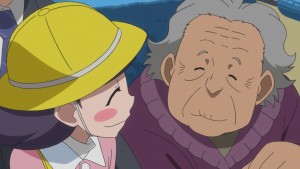 Here’s the thing – when you criminalize something or someone you are, by definition, turning those who practice or represent it into criminals. It’s not simply a matter of legal definitions, either – it’s about behavior. The real-world implications are endless both as regards Japan and the world at-large, but in terms of Concrete Revolutio what we’ve seen is that in the crackdown on superhumans after the Shinjuku protest, superhumans have been reduced to criminal behavior. And superhumans who formerly acted altruistically have responded to persecution and imprisonment by acting selfishly – for their own gain, and for payback.
Here’s the thing – when you criminalize something or someone you are, by definition, turning those who practice or represent it into criminals. It’s not simply a matter of legal definitions, either – it’s about behavior. The real-world implications are endless both as regards Japan and the world at-large, but in terms of Concrete Revolutio what we’ve seen is that in the crackdown on superhumans after the Shinjuku protest, superhumans have been reduced to criminal behavior. And superhumans who formerly acted altruistically have responded to persecution and imprisonment by acting selfishly – for their own gain, and for payback.
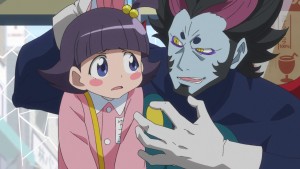 The everyman protagonist of the episode is very much a victim, caught up in all this. It turns out that in this reality Goldenrod actually does have a health impact – it causes the spread of “superhuman disease”. But while for most people it’s a big problem, Dad actually likes being afflicted – because when he turns into “Ningen Man” he’s someone his daughter admires and worships. When he fails a blood test for superhuman disease his boss gives him an unapproved antidote (reassuring him that it’s known to be safe because the company tested it on elementary school children) but he secretly washes it down the sink.
The everyman protagonist of the episode is very much a victim, caught up in all this. It turns out that in this reality Goldenrod actually does have a health impact – it causes the spread of “superhuman disease”. But while for most people it’s a big problem, Dad actually likes being afflicted – because when he turns into “Ningen Man” he’s someone his daughter admires and worships. When he fails a blood test for superhuman disease his boss gives him an unapproved antidote (reassuring him that it’s known to be safe because the company tested it on elementary school children) but he secretly washes it down the sink.
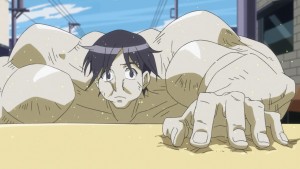 All the regulars get involved here, including a bunch of returnees from the first season – Daitetsu, Earth-chan, Yumihiko. Earth-chan is as always interesting, because she remains fixated as ever on absolute good and evil – which ConRevo tries very hard to prove are meaningless concepts. When the government comes to destroy the goldenrod Ningen Man stops them, even though he knows people will be hurt, because he wants his daughter to be happy. Jirou defends him based on the romantic idea that fighting for children is the essence of being superhuman. That makes them evil in the eyes of both Earth-chan and the Bureau – but in fact, by preventing the government from torching the field they save our old friend Campe, last of the Tartaros Bugmen – who’d been hiding their inside a pupa which the little girl had somehow convinced herself was her mother. Surely, there’s a commentary on the dangers of rash environmental decisions there.
All the regulars get involved here, including a bunch of returnees from the first season – Daitetsu, Earth-chan, Yumihiko. Earth-chan is as always interesting, because she remains fixated as ever on absolute good and evil – which ConRevo tries very hard to prove are meaningless concepts. When the government comes to destroy the goldenrod Ningen Man stops them, even though he knows people will be hurt, because he wants his daughter to be happy. Jirou defends him based on the romantic idea that fighting for children is the essence of being superhuman. That makes them evil in the eyes of both Earth-chan and the Bureau – but in fact, by preventing the government from torching the field they save our old friend Campe, last of the Tartaros Bugmen – who’d been hiding their inside a pupa which the little girl had somehow convinced herself was her mother. Surely, there’s a commentary on the dangers of rash environmental decisions there.
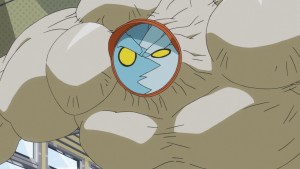 So who’s “right” here, and who’s wrong? Sorry Earth-chan, but I don’t think there’s an answer. Justice, equality, freedom – all these big ideals at play in Concrete Revolutio are in a state of perpetual conflict, and what’s more their definitions are themselves flexible. More than any episode since the first season finale, this one recalls the “whose side are you on?” dynamic at the heart of this series, and the notion that moral and ethical choices are rarely easy in the real world. “Justice, peace, freedom? Defending my freedom disturbs the peace! Pursuing your justice violates my freedom! There is no single answer!” These are not easy, bite-size nuggets for an audience to chew on – but in terms of elevating the climate of modern anime, they’re the ultimate health food.
So who’s “right” here, and who’s wrong? Sorry Earth-chan, but I don’t think there’s an answer. Justice, equality, freedom – all these big ideals at play in Concrete Revolutio are in a state of perpetual conflict, and what’s more their definitions are themselves flexible. More than any episode since the first season finale, this one recalls the “whose side are you on?” dynamic at the heart of this series, and the notion that moral and ethical choices are rarely easy in the real world. “Justice, peace, freedom? Defending my freedom disturbs the peace! Pursuing your justice violates my freedom! There is no single answer!” These are not easy, bite-size nuggets for an audience to chew on – but in terms of elevating the climate of modern anime, they’re the ultimate health food.



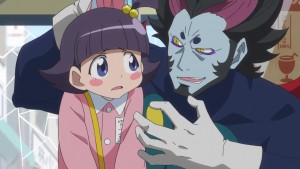
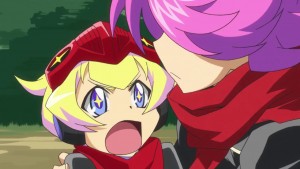
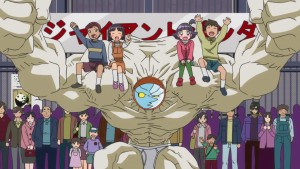
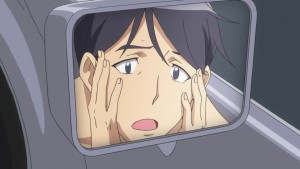
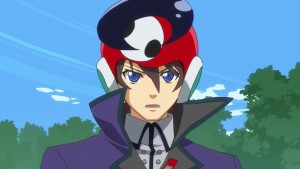
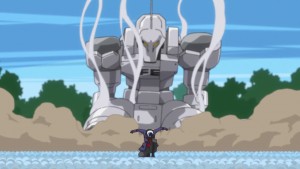

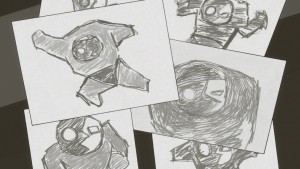
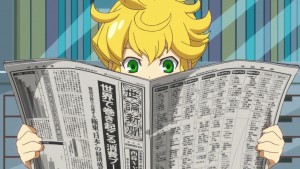
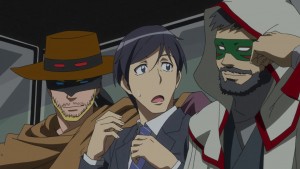
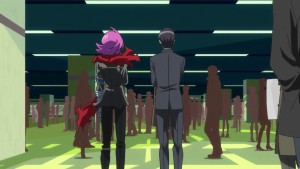
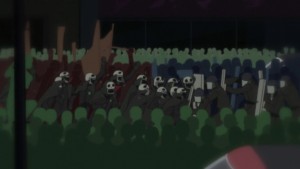
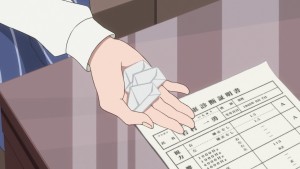
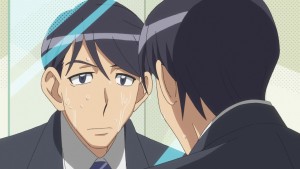
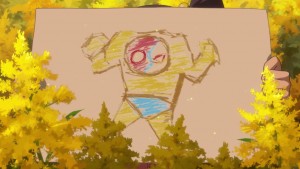
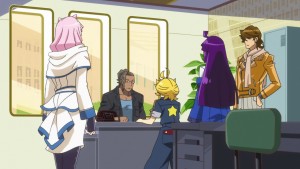
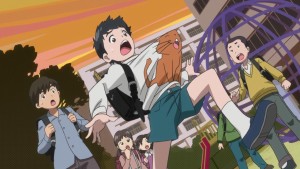
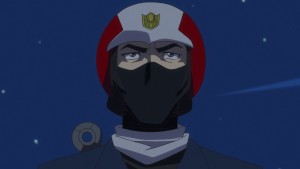
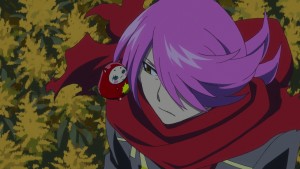
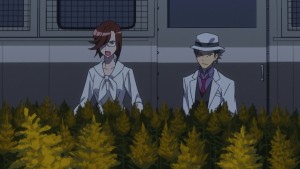
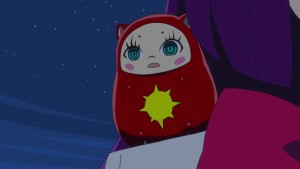
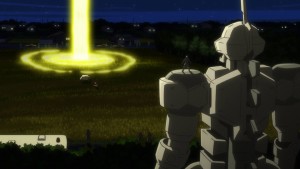
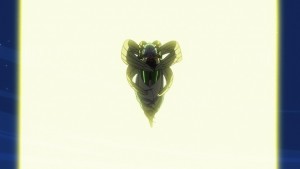
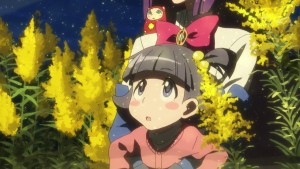

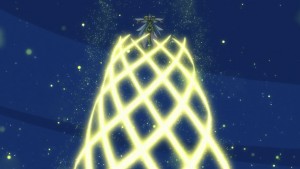
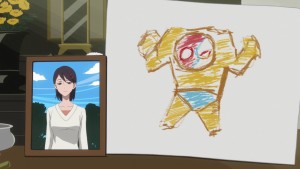
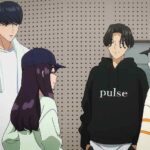
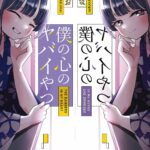
Flower
May 7, 2016 at 6:39 pmThis episode was …well … both incredible and packed. Wow. It’s been a while since I saw something with so much obvious sub text going on that is both in your face and yet just barely out of sight.
Downright great material! ^^
fgfdfh
May 7, 2016 at 8:59 pmI haven’t seen an anime that demand so much from the viewers for a long time. This episode resolve a cliffhanger 4 months ago, reintroduce characters from the 2nd episode, and has dozens characters with different motivations. Then there’s a huge amount of Japanese historical, social and political commentaries. This show will never be successful with mainstream audiences, so I praise Bones for making this.
ftghb
May 8, 2016 at 12:56 amI only picked up concrete revo last week, and I binge watched from season 1 all the way till now. I thoroughly enjoyed it, but I had no idea the amount of japanese political symbolism there was in this. New level of appreciation for this now……i do find it ironic though, the way they show the opening and depict 3 factions, as discrete, separate entities fighting each other; when in fact, there’s a lot of infighting/overlap between the 3 agencies……as shown by jiro turning away earth-chan.
Guardian Enzo
May 8, 2016 at 8:50 amIf they tried to depict all the subtle permutations within all the factions in the OP, there’d be no time for the episode!
Aikawa Shou is probably the most overtly political mainstream anime writer out there. That doesn’t seem to be what most anime fans want – I think it’s a major reason Eureka Seven AO wasn’t well-received despite being brilliant. But I love it, and ConRevo may just be his most political work yet. It’s amazingly complex and very challenging.
Earthling Zing
May 8, 2016 at 4:26 amI’m still wondering how they are going to conclude the story, its a great ride but the cast just keeps getting bigger, without any sign of what the central conflict is going to be.